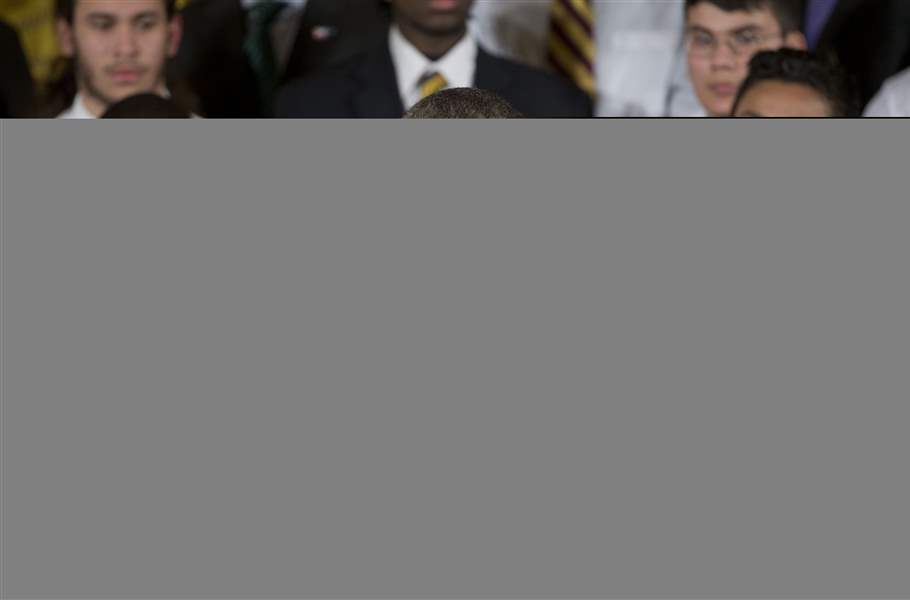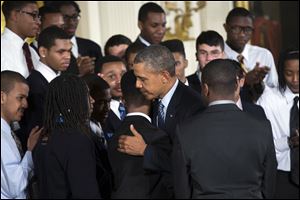
Obama unveils plans to put young, minority boys on path to success; he vows lifelong effort
2/27/2014
President Barack Obama pauses while speaking in the East Room of the White House in Washington, Thursday, Feb. 27, 2014, where he announced a new initiative to provide greater opportunities for young black and Hispanic men called 'My Brothers Keeper'. The White House is partnering with businesses, non profits and foundations to address disparities in education, criminal justice and employment. (AP Photo/Pablo Martinez Monsivais)
ASSOCIATED PRESS

Joined at the White House by young men of color, President Obama called on America's businesses, philanthropists and government leaders to join forces to put more boys on a path toward successful lives.
WASHINGTON — In strong, often personal terms, President Barack Obama on Thursday called for vigorous efforts to reverse underachievement among young black and Hispanic males. He also cautioned young minority men not to repeat his own youthful mistakes in an unforgiving world.
The president kicked off his “My Brother’s Keeper” initiative from the White House East Room, appearing on stage with teenagers involved in the Becoming a Man program for at-risk boys in his hometown of Chicago.
The aim is to “start a different cycle,” Obama said. “If we help these wonderful young men become better husbands and fathers and well-educated, hardworking, good citizens, then not only will they contribute to the growth and prosperity of this country, but they will pass those lessons on to their children, on to their grandchildren.”
The president said he, too, could have been a negative statistic, because of his own unfocused anger over having no father at home.
“I made bad choices. I got high, not always thinking about the harm it could do. I didn’t always take school as seriously as I should have. I made excuses. Sometimes I sold myself short,” Obama said.
The large, mostly African-American and Hispanic crowd was dotted with dignitaries, among them black and Hispanic members of Congress, NBA great Earvin “Magic” Johnson, former Secretary of State Colin Powell, former New York Mayor Michael Bloomberg and Chicago Mayor Rahm Emanuel. Also present were the parents of Trayvon Martin and Jordan Davis, two black Florida teenagers killed in separate shootings.
Transportation Secretary Anthony Foxx was there, too, and Obama said they had discussed the fatherless childhoods they had in common.
Addressing America’s young men of color directly, Obama told them to have “no excuses” and to “tune out the naysayers who say if the deck is stacked against you, you might as well just give up or settle into the stereotype.”
“Nothing will be given to you,” Obama said. “The world is tough out there. There’s a lot of competition for jobs and college positions and everybody has to work hard. But I know you guys can succeed.”
Steve Benjamin, the first black mayor of Columbia, S.C., who called last month for the creation of a Center of Excellence for Black Male Achievement in his city, told reporters at the White House that Obama’s program is not about “shifting responsibility for what they have to do, we’re talking about collective responsibility to make sure that the American dream is good for all people.”
Under Obama’s initiative, businesses, foundations and community groups would coordinate investments to come up with or support programs that help keep young people out of the criminal justice system and improve their access to higher education. Several foundations pledged at least $200 million over five years to promote that goal.
Meanwhile, Obama signed a presidential memorandum creating a government-wide task force to evaluate the effectiveness of various approaches, so that federal and local governments, community groups and businesses will have best practices to follow. An online “What Works” portal will provide public access to data about programs that improve outcomes for young minority men.
The White House posted a list of figures it said underscored a need for the initiative: The unemployment rate for African-American men over the age of 20 was 12 percent last month, compared with 5.4 percent for white men. Hispanic men over the age of 20 had an unemployment rate of 8.2 percent. The U.S. Census Bureau showed a poverty rate of 27.2 percent in black households and 25.6 percent for Hispanic households in 2012, compared with 12.7 percent in white and 11.7 percent in Asian households.
“The president, I think, is uniquely qualified to talk about this,” Bloomberg told reporters after the event. “The president is part African-American. The president did not have a father growing up. He knows the problem and yet he turned out to be president of the United States. You can’t have a better role model. I think this is exactly the kind of thing he should focus on.”
The phrase “my brother’s keeper” comes from the Book of Genesis in the Bible, where God asks Cain, the son of Adam and Eve, for the location of his brother Abel, whom Cain had killed. In some versions, Cain replies: “Am I my brother’s keeper?” Obama has quoted that Bible portion several times during his presidency, saying Americans should look out for each other.
Freed from the pressure of seeking re-election, Obama has taken a more visible role on issues affecting minorities. The president has moved to commute sentences for nonviolent drug offenders, hoping to combat sentencing disparities that disproportionately imprison minorities. Attorney General Eric Holder this month encouraged states to repeal laws that permanently bar felons from voting even after they have served their sentences.
Democratic Rep. John Lewis of Georgia, a hero of the civil rights movement, called the president’s initiative “long overdue.”
“I think we have to make this work,” Lewis said. “This is a great launching to save a whole generation of young men of color, and if we can do it now it will pay off for generations to come.”